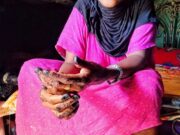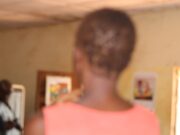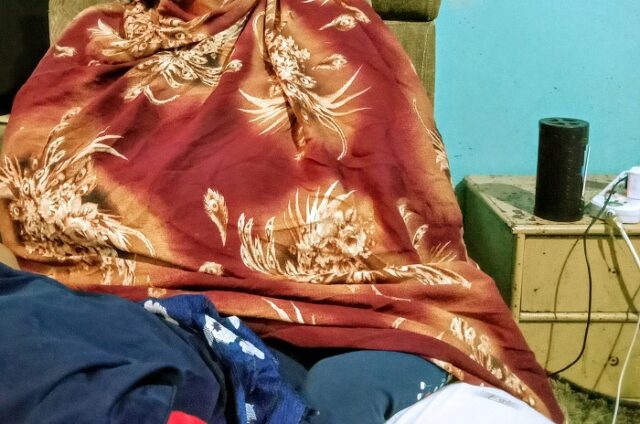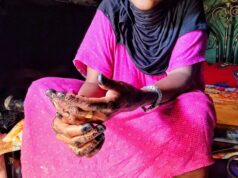What happens when the birth of your child nearly kills you? Farhiya lived through that experience and in this post, she talks about how a near-death experience during childbirth made her resolve not to give birth again. So what exactly happened?
By Maryanne W. Waweru l wawerumw@gmail.com l @MaryanneWaweru
When 35-year-old Farhiya felt the pangs of labor, she knew what would happen next. It being her 10th child, she had been through the routine many times before. Farhiya slowly walked to the public health facility within her neighbourhood in Eastleigh Third Avenue, where she had delivered all her other babies.
While Farhiya remembers delivering her baby safely, she cannot recall how she ended up in an unfamiliar environment. All she remembers is waking up confused, a team of medics hovering around her, worried looks on their faces. The unfamiliar environment Farhiya found herself in was at Pumwani Maternity Hospital.
But how did she get there?
The missing baby
“I had no idea how I had gotten to Pumwani or what I was doing there. I remembered delivering my baby well, but when I stretched out my hand on the bed in a bid to find her, she wasn’t there. I panicked. What had happened to my baby? What had happened to me?” Farhiya wondered.
It turns out that after delivery, Farhiya had suffered a retained placenta, whose complications had led to post-partum haemorrhage (PPH) –severe vaginal bleeding after childbirth. The excessive blood loss had rendered her unconscious, and it was during that time that she had been transferred –via ambulance –to the larger and better equipped Pumwani Maternity Hospital, the largest obstetric and maternal referral hospital in Kenya.
Post-partum haemorrhage is the leading cause of maternal mortality in Kenya. One of the risk factors for PPH is having many births –the risk going up the more times a woman gives birth.
My worried husband
“When I spoke with my husband, he told me that I had nearly died from the bleeding. I had never suffered any complications with my previous nine births. He described to me the emergency situation the haemorrhage had caused, saying that it had greatly frightened him. It frightened me too!” remembers Farhiya, who remained admitted at Pumwani Maternity Hospital for two weeks.
Farhiya’s children’s years of birth are: 2004, 2006, 2007, 2009, 2011, 2013, 2015, 2017, 2019 and 2022.
Having nearly lost her life with her lastborn, she decided she would not give birth again.
“I had a discussion with my husband, and I told him I was afraid of getting pregnant again as I would surely die during the next childbirth. He was in agreement and said that the 10 we already had were good enough.”
Breastfeeding to prevent another pregnancy
Farhiya’s lasborn is now six months old. Since she does not want more children, what is she doing to avoid another pregnancy?
“For now, I’m breastfeeding my daughter as I believe it is an effective method of preventing pregnancy. Every time I have breastfed my other children, I do not see my period but as soon as I stop, I see it again and I get pregnant. So for as long I’m still breastfeeding my daughter now, I’m not worried about getting pregnant,” she says.
Visiting a family planning clinic
In the meantime, Farhiya says she has been thinking about going to the family planning clinic.
“I might need to get on a contraceptive as soon as I stop breastfeeding, so I need to think about the different options available,” she says.
“I’ll start with the pills as I think they are the safest. I will not take the injection because I have a friend who started bleeding heavily after she started using it. I also don’t want the implant as I don’t want something foreign in my body,” she says.
Also read: The story of Sadiya and Mama Kevo of Eastleigh’s 7th Street
Farhiya is one of the 76% of urban Somali refugee women in Nairobi who do not use any modern family planning method. This is according to a recent study undertaken by Dr. Eliphas Gitonga Makunyi, a population and sexual reproductive health expert and lecturer at Kenyatta University.
Dr. Gitonga’s study sought to examine the utilization of family planning among blended married Somali refugee women aged 15-39 years in Nairobi County. The study area was specifically Kamukunji, Embakasi, and Ruaraka sub-counties, where the highest portion of the Somali community lives.
The blend included Somali women from neighbouring countries (refugees) and natives from Nairobi and the northern region of Kenya. This is the first detailed study specifically focusing on Somali refugees (who make up the highest percentage of the refugee population in Kenya and in Nairobi County).
Modern family planning among Somali refugee women
The study established the prevalence of modern family planning among Somali refugee women as 24%, compared to that of 43.5% among native Somali women.
Among the Somali refugee women using family planning, the preferred methods are Implant (31%), male condom (27%), injectable (19%), Intra uterine device (10%), pill (9%) and others (4%).
Among the native Somali women using family planning, the preferred methods are injectable (40%), Implant (26%), pill (21%), Intra uterine device (6%), male condom (3.5%) and others (3.5%).
Involving Somali men in family planning
Dr. Gitonga’s findings indicate that the factors associated with modern family planning utilization include: place of residence, age group, religious beliefs, community beliefs, perception of being a community misfit, information on family planning, husband approval, peer approval, constructive male involvement, and duration within the city as a refugee.
The Somali community is a heavily patriarchal one. With this regard, one of the study’s key recommendations is for urban reproductive health and refugee policymakers to devise interventions to engage men in family planning conversations, for better maternal health outcomes.
Learn more about the study here.
Do you have feedback on this article? Comment down below or email me at wawerumw@gmail.com
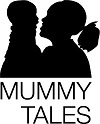 Mummy Tales is a platform dedicated to empowering its readers on different aspects of womanhood and motherhood. Read more motherhood experiences of Kenyan moms here. Connect with Mummy Tales on: FACEBOOK l YOU TUBE l INSTAGRAM l TWITTER
Mummy Tales is a platform dedicated to empowering its readers on different aspects of womanhood and motherhood. Read more motherhood experiences of Kenyan moms here. Connect with Mummy Tales on: FACEBOOK l YOU TUBE l INSTAGRAM l TWITTER














